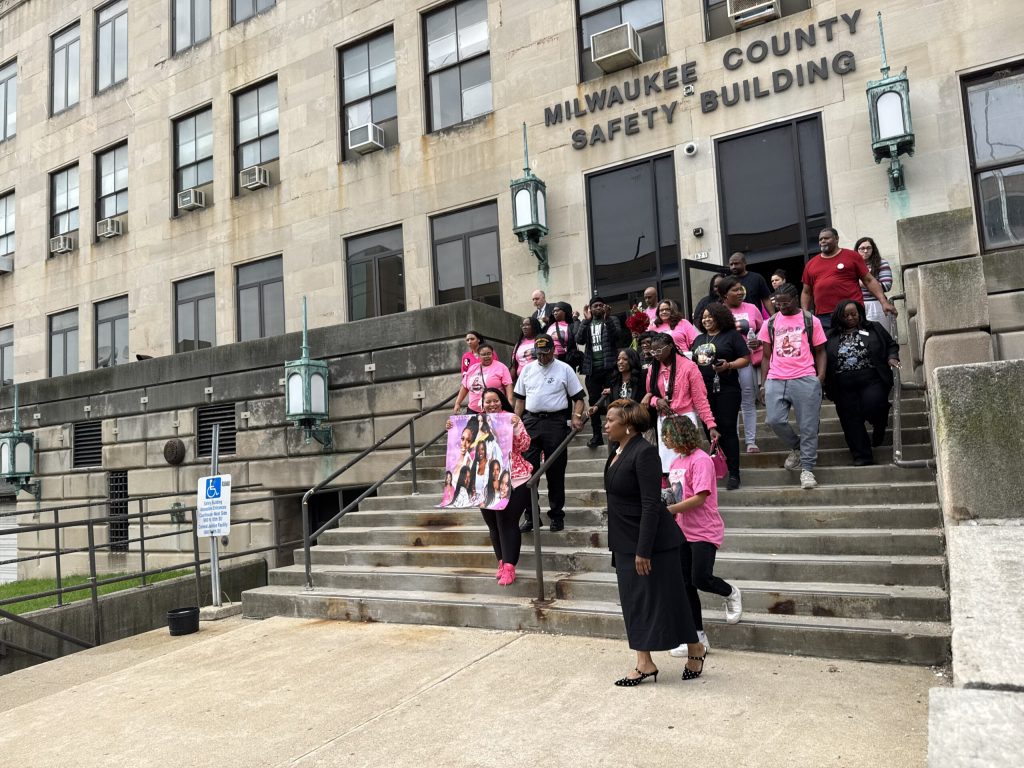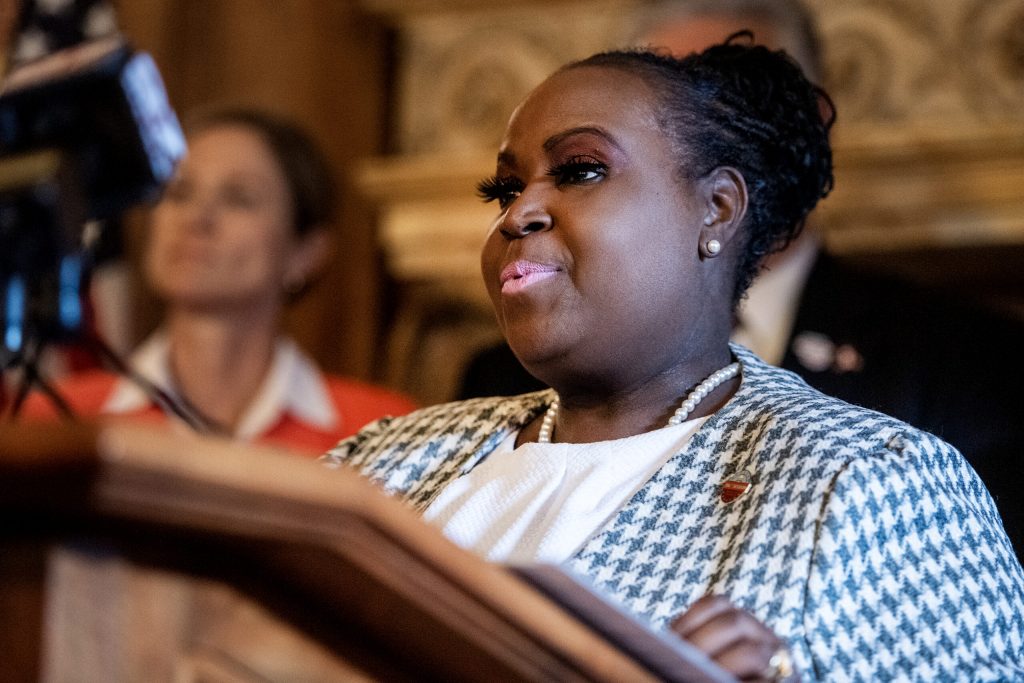Why Are Black Women More Likely to be Murdered?
Numbers are shocking. Wisconsin bill would create task force to study issue.

A group of supporters and family of Sade Robinson gathered of the Milwaukee County Courthouse on June 6, 2025. Evan Casey/WPR
In Wisconsin, Black women and girls face a disproportionate likelihood of being murdered.
But efforts to create a task force that would address that disparity have stalled for years.
Stubbs said the 17-member task force would focus on data collection and helping victims and their communities. It would examine the reasons behind the violence targeting Black women and girls, and make recommendations for reducing that violence, according to a draft bill released Friday.
The bill would appropriate $80,200 in the next fiscal year for one full time DOJ staff member who would be responsible for overseeing the initiative.
“Today, we say no more to violence facing African American women and girls,” Stubbs said. “We say no more to the disappearance of our loved ones. We say no more to the lack of resources, the lack of awareness, the lack of support for the issues that have impacted so many Wisconsinites.”
A study published in the Lancet last year found that, across the country, Black women are more likely than white women to be murdered. That pattern is longstanding and has been “virtually unchanged since 1999,” the study’s authors noted.
In Wisconsin, those differences are especially pronounced. In 2020, Black women were 20 times more likely than white women to be murdered in Wisconsin. That was greatest disparity of any state examined by the study. Research has also shown that, across the country, missing women of color get less media attention than missing white women.
Robinson is Black, and her case became a symbol of violence against Black women and girls after the 19-year-old Milwaukee Area Technical College student was reported missing in April 2024. In June, a jury convicted Maxwell Anderson of murdering Robinson and mutilating her corpse.
“My angel was brutally murdered, dismembered and disrespectfully spread across Milwaukee in the worst possible way,” Robisnon’s mother, Sheena Scarbrough said. “You can imagine the things that we have gone through as a family.”
Speaking at a news conference Friday, Scarbrough said, while it’s too late to save her daughter, she hopes other families will be spared the same pain.
Minnesota launched similar task force, but Wisconsin efforts stall
In 2021, neighboring Minnesota launched its own task force on missing and murdered Black women.
Some lawmakers are hopeful that Wisconsin will follow suit. Stubbs first introduced a bill to create the task force in 2021 but it fizzled out without a legislative hearing.
Last session, Stubbs reintroduced the bill and gained Republican cosponsors. That version cleared the Republican-led Assembly but was never scheduled for a vote in the GOP-controlled state Senate.
Last time around, the bill was originally referred to Committee on Government Operations, which was chaired by state Sen. Duey Stroebel, R-Cedarburg. At the time, Stroebel said he believed the bill was “well-intentioned” but said he had concerns about focusing on “only one facet of a much broader societal problem.”
“I believe that every person who is missing or murdered deserves equal justice under the law,” Stroebel said in a prior statement. “I have a difficult time legislating in a way that allows government to prioritize justice based on a victim’s race or gender.”
Strobel is no longer in the state Legislature after losing a reelection bid in November 2024.
Stubbs described the proposal as bipartisan, and said she’s optimistic about its chances this session. The latest version has several Republican coauthors including state Sen. Jesse James of Thorp and state Rep. Pat Snyder of Weston, Stubbs said.

Rep. Shelia Stubbs speaks during a press conference Thursday, Sept. 21, 2023, at the Wisconsin State Capitol in Madison, Wis. Angela Major/WPR
Wisconsin Attorney General Josh Kaul, a Democrat, is also speaking out in support of Stubbs’ bill.
In 2020, Kaul created a similar task force within his Department of Justice focused on missing and murdered indigenous women. Kaul took that action without a law approved by legislators.
“We don’t currently have available funding that we can use to put towards this task force, but I think it’s critical that there be funding,” Kaul said. “I think it’s vitally important that the Legislature is at the table for these discussions, because we don’t just want to have a task force that meets and develops solutions that then don’t go anywhere.”
Why are Black women more likely to be murdered? Wisconsin bill would create task force. was originally published by Wisconsin Public Radio.
If you think stories like this are important, become a member of Urban Milwaukee and help support real, independent journalism. Plus you get some cool added benefits.























I wonder if Duey Stroebel realizes our current legal and law enforcement force on only group, white women and girls. This bill would actually expand the focus of Wisconsin law enforcement. I wonder also if Stroebel realizes that Milwaukee is a hot bed for sex trafficking. I wonder if Stroebel is asleep on the job, since he seems to be focused on maintaining the status quo.
Strobel’s comment that the disproportionate murder of Black women is (only) part of a broader problem—and therefore reason not to establish a task force—is hideous, a reflection of how the right strategically disowns groups that are already marginalized by dominant white (and straight, and cisgendered) culture to ensure ultra-right/white votes.
That said, we don’t need a state sanctioned, legislatively approved task force to know the reasons. Black women are born into traumatized families and communities that suffer significant economic disparities. They are devalued and even demonized by dominant white culture and classically erased as victims by the media in ways victims who happen to be white women are not.
I’m all for the cause. I say give up on a state task force, generate whatever data you feel you need privately, and start owning the media’s attention like never before. Shame the politicians, educate the ignorant, and keep the issue front and center,